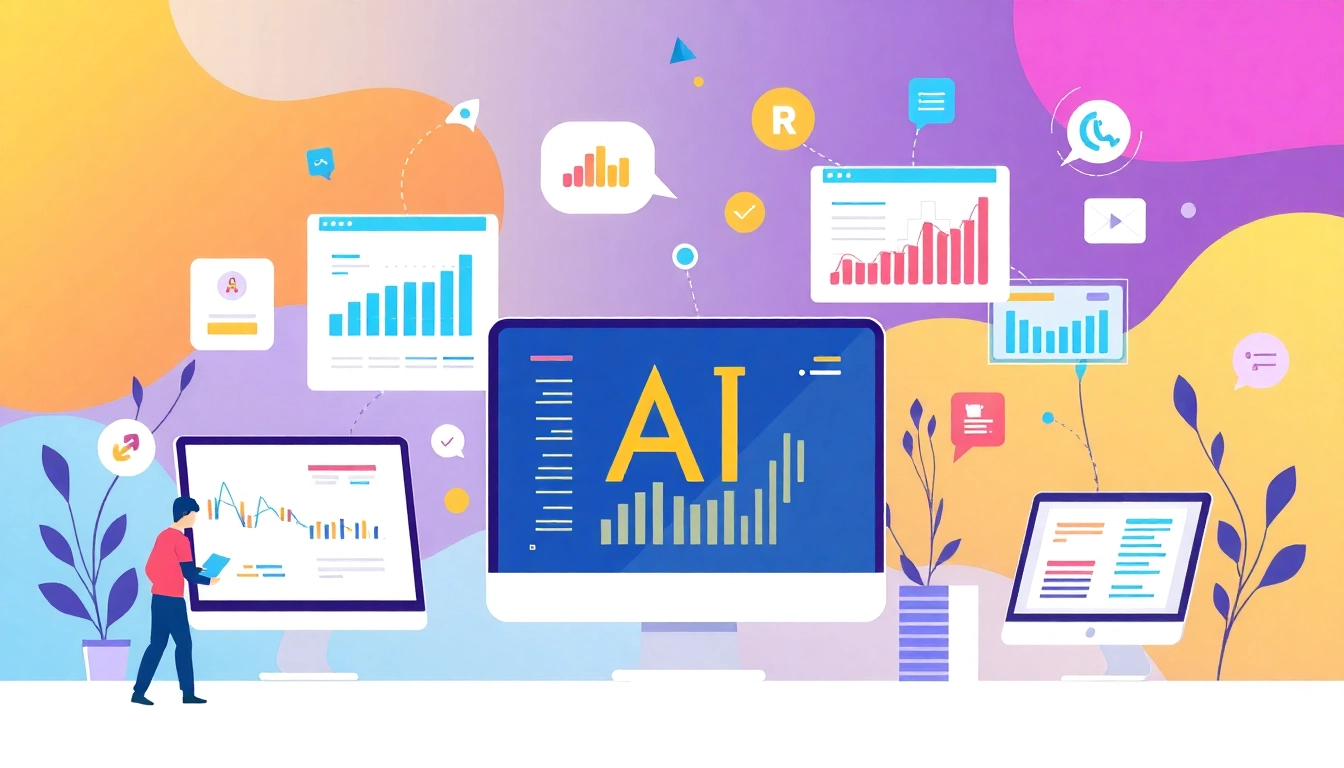Understanding AI Marketing Tools
What Are AI Marketing Tools?
AI marketing tools are advanced software solutions powered by artificial intelligence that help businesses enhance their marketing efforts. They leverage algorithms, machine learning, and data analytics to automate tasks, optimize marketing strategies, and personalize customer experiences. These tools can range from chatbots that engage customers to sophisticated analytics platforms that provide insights into consumer behavior.
The Importance of AI in Modern Marketing
In an increasingly digital world, where consumer preferences evolve rapidly, the significance of AI marketing tools cannot be overstated. These tools facilitate real-time data processing and enable businesses to make informed decisions swiftly. They enhance efficiencies, reduce human error, and allow marketers to focus on strategy rather than repetitive tasks.
Key Features of AI Marketing Tools
AI marketing tools come with a myriad of features designed to streamline marketing efforts:
- Automation: From emails to social media postings, automation saves time and ensures consistency across channels.
- Predictive Analytics: These tools analyze past data to forecast future trends, assisting marketers in crafting proactive strategies.
- Personalization: AI tools can analyze consumer data to deliver personalized content, enhancing user engagement.
- Performance Tracking: They provide real-time analytics and reports, helping marketers measure the success of their campaigns.
Types of AI Marketing Tools
Content Generation Tools
Content generation tools use AI to help marketers create compelling content without the time-consuming manual effort. These tools can assist in writing blog posts, generating ad copy, or designing engaging visuals. For example, platforms like Jasper AI are popular for their ability to create high-quality marketing copy tailored to various audience segments.
Analytics and Data Tools
Data is the cornerstone of effective marketing strategies. AI analytics tools analyze vast amounts of data to uncover trends, insights, and consumer behavior patterns. Tools like Google Analytics and HubSpot can integrate AI capabilities to enhance data interpretation, helping marketers make data-driven decisions with confidence.
Social Media Management Tools
Social media leads the charge in digital marketing, and AI-powered social media tools streamline the management of these critical platforms. Tools such as Buffer and Hootsuite assist marketers in scheduling posts, analyzing engagement metrics, and providing insights into audience preferences, allowing for more effective social media strategies.
Benefits of Using AI Marketing Tools
Enhanced Efficiency and Productivity
The automation capabilities of AI marketing tools significantly enhance efficiency, allowing marketing teams to focus more on strategic initiatives rather than mundane tasks. Automated processes such as email marketing campaigns and social media posts ensure timely delivery and more consistent engagement.
Data-Driven Decision Making
With AI tools, businesses can analyze customer behaviors and market trends more effectively. This data-driven approach enables informed decision-making, allowing marketers to adapt quickly to market changes and enhance campaign performance. As a result, companies can allocate budgets more efficiently, ensuring resources are directed toward the most effective strategies.
Improved Customer Engagement
AI marketing tools excel in understanding and anticipating customer needs. Through personalized content delivery and timely communications, businesses can foster stronger relationships with customers, which in turn boosts engagement and loyalty. Tools equipped with machine learning capabilities can learn from customer interactions and continuously improve their offerings.
Choosing the Right AI Marketing Tool
Assessing Your Business Needs
When considering AI marketing tools, it’s vital to assess your business’s specific needs and objectives. Different tools cater to distinct requirements, so determining the specific functionalities your team requires—be it content creation, analytics, or social media management—ensures a better fit and effective implementation.
Cost vs. Value Analysis
Evaluating the cost implications of AI marketing tools against the value they provide is crucial. While some tools may have a high upfront cost, their ability to streamline processes and enhance customer engagement can yield a significant return on investment. It’s wise to consider not only the pricing but also the potential long-term savings and benefits.
Trial Periods and Reviews
Taking advantage of trial periods can be an effective way of evaluating the usability and effectiveness of AI marketing tools. Additionally, researching user reviews and testimonials provides insight from other businesses regarding their experiences with specific tools, helping to make an informed choice.
Future Trends in AI Marketing Tools
Predictions for 2025 and Beyond
The landscape of AI marketing tools is ever-evolving. By 2025, we anticipate further integration of AI with other technologies such as augmented reality (AR) and virtual reality (VR), providing immersive customer experiences. Moreover, as AI algorithms become more sophisticated, we can expect heightened personalization and improved predictive analytics capabilities.
Integrating AI with Other Technologies
The integration of AI marketing tools with other technologies—like Customer Relationship Management (CRM) software—will enhance the overall marketing ecosystem. This synergy will allow marketers to create a seamless experience across all customer touchpoints, ensuring that every interaction is relevant and meaningful.
Case Studies of Successful Implementations
Examining case studies of businesses that have successfully implemented AI marketing tools can provide valuable insights. Companies like Coca-Cola and Unilever have leveraged AI tools to revamp their marketing strategies, leading to improved customer engagement and increased sales. These real-world applications highlight the tangible benefits of adopting AI tools into marketing strategies.



